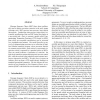334 search results - page 19 / 67 » Standardization in action |
AAMAS
2000
Springer
14 years 9 months ago
2000
Springer
We adopt the decision-theoretic principle of expected utility maximization as a paradigm for designing autonomous rational agents, and present a framework that uses this paradigm t...
100
click to vote
BIBE
2006
IEEE
15 years 3 months ago
2006
IEEE
We show how chemical background knowledge can be used to improve the prediction performance in structureactivitity relationships (SARs) for non-congeneric compounds. The goal of t...
IDA
2009
Springer
14 years 7 months ago
2009
Springer
We address the applicability of blind source separation (BSS) methods for the estimation of hidden influences in biological dynamic systems such as metabolic or gene regulatory net...
ACSD
2003
IEEE
15 years 3 months ago
2003
IEEE
Message Sequence Charts (MSC) have been traditionally used to depict execution scenarios in the early stages of design cycle. MSCs portray inter-process ( inter-object) interactio...
CDC
2009
IEEE
15 years 2 months ago
2009
IEEE
— Multi-agent coordination problems can be cast as distributed optimization tasks. Probability Collectives (PCs) are techniques that deal with such problems in discrete and conti...

